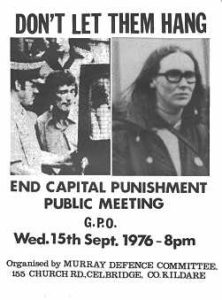Fifth Estate Collective
Latest on Murray Case

There’s not much news on the fate of Marie and Noel Murray at this point. Although the two Irish anarchists have attempted to withdraw the appeals of their death sentences (see FE, October and November, 1976), they are still being considered by the Irish supreme court because of a point of law which allows capital punishment for killing a police officer, but not for killing citizens in general. Reynolds, the Dublin cop allegedly murdered by the Murrays, was not in uniform or on duty at the time of the killing.
The Fifth Estate recently spoke to Stuart Christie, a contact in Scotland who is close to affairs in the libertarian movement. Christie predicts the death sentences will be confirmed but commuted by the government. The Irish Labor Party (a minority party within the government) is against capital punishment in all cases on moral grounds. Since the I LP has a majority of ministers in departments which closely relate to the case, instead of being executed, the Murrays may just be sentenced to 30 to 35 years in prison.
Though Freedom (an English anarchist publication) reported in its October issue that the trial of Ronan Stenson (the third person arrested for the killing) was to begin that month, it has not as yet taken place. Christie says that Stenson, who was beaten so badly during a torture session, is still little more than a vegetable and probably will never be tried.
In Europe there has been overwhelming enthusiasm for the defense of the Murrays. Christie told the FE: “The response to the case has been amazing. There’s one group in Madrid organized by the CNT (Spanish anarcho-syndicalist union). Some anarchists were arrested by the parish police after demonstrating in front of the Irish embassy. This is very embarrassing for the Irish government.” None of the main political organizations in Ireland have taken a stand. The Irish Republican Army (IRA), one of the groups most victimized by the same special tribunal that convicted the Murrays, has been strangely silent on the case.
Though response has come from organizations in France, Germany, England and Spain, the Irish government has given no publicity to the protests, stating it is illegal for the government to comment while the case is still not settled.
In the United States activity to support the Murrays has been growing, with demonstrations reported taking place in their behalf in New York City, Boston and Philadelphia as well as many more publications giving coverage to the case. The Murray Defense Committee recently received a major boost as Bernadette Devlin McAlinsky, the Irish-civil rights leader, toured the United States in December and, much to the surprise of the trotskyist front group that sponsored her tour, she spent the better part of each of her speeches calling for justice for the Murrays. McAlinsky appeared on national TV and spoke of the case, marking the first time it has received any mass media coverage in this country.
Although the Irish government may be unwilling, as Christie predicts, to permit the spectacle of an imported Rhodesian hangman executing two Irish citizens (the first to face the noose in that country in 22 years), no defense—efforts should be slackened, for their reprieve is by no means a certainty. Also, a “reduction” of sentence to 35 years imprisonment on a frame-up trial is hardly anything to celebrate.
Letters of protest should be sent to: The Minister of Justice, 72–76 St. Stephens Green, Dublin,-Eire, or The Ambassador, Republic of Ireland, 2234 Mass. Ave., N.W., Washington, DC 20008.
Also, the Murray Defense Committee needs money to continue the struggle—donations should be sent to: Murray Defense Committee, 155 Church Rd., Celbridge, County Kildare, Eire
Related: Murrays’ Execution Stayed (FE 280, February, 1977)
